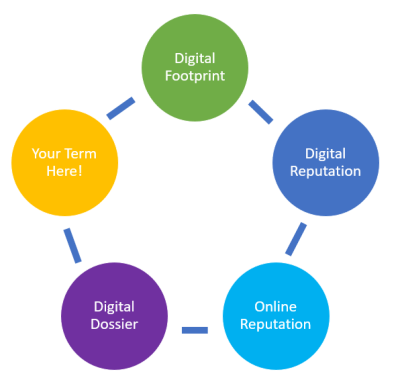Digital footprint, digital dossier, online reputation, digital reputation … insert your term here: _________. Whatever you choose to call it, teaching high school students how to manage their online reputation is more about teaching them to share thoughtfully and less about telling them not to post.

Librarians have been teaching students to be thoughtful about their online footprint for years; keeping lessons relevant to the needs of our students — who are more connected than ever — is key.
How well will you be Googled?
High school students need to understand that the answer to this very simple question can make a difference in their future. They also need to be aware that information they share can hurt or help them with college admissions, scholarships and obtaining a job. Students need to understand what strangers can learn about them online.
Common Sense Media and Netsmartz have some great resources for teaching digital citizenship. This video, part of Common Sense Media’s Trillion Dollar Footprint lesson, is a quick introduction to the idea of a digital footprint. The one-minute video points out the permanency of information posted online and how easily information can be searched, copied, shared and broadcasted.
With the world at their fingertips via smartphones, librarians need to help teens be mindful about the information they share and use to cultivate their trillion-dollar online presence.
How to stay in control

Ready to help your high school students stay into control of their online reputation? Check out these great tips to share with students:
- Be aware of photographs taken of you and photos of you that someone else “tags” and posts. This includes family members.
- Before you post, think about what information to share, where to share it and how to share it.
- Get rid of your inactive accounts. Unattended profiles could raise questions.
- Google yourself. Know what others will see when they search for you.
- Don’t disappear. People, such as potential employers and college admissions officers, want to find you online.
- Regularly check the privacy settings of your online accounts. Make sure you know what you are sharing and with whom.
- Remember that not everything you see, read or hear about online is true. Avoid forwarding on false information.
- Were some of your past posts less than stellar? Bury the negative with positive posts.
Teaching resources
- 6 Degrees of Information: What can someone find about you online in just six clicks? This is a good video to highlight how family members can affect your digital footprint.
- Be Internet Awesome: Digital citizenship lessons from Google. Try using the Profile Guessing Game as an introduction to the student activities in Common Sense Media’s College Bound or Trillion Dollar Footprint.
- College Bound (9-12): Common Sense Media's lesson about the effect of posted information on future opportunities. Students practice being college admissions officers to compare applicants' online postings.
- Manage Your Online Reputation: Video created by Google about managing your online reputation and digital footprint. The video is part of the Google Citizenship and Safety course.
- Oops! I Broadcast It on the Internet (9-12): Common Sense Media's lesson on the dangers of oversharing.
- Private Today, Public Tomorrow (9-12): Common Sense Media's lesson about respecting others' privacy. Student activity illustrates the impact that friends can have on a digital reputation and how images can be deceiving.
- Trillion Dollar Footprint (6-8): Common Sense Media's lesson focusing on forms of online information that make a digital footprint. Student activity involves comparing online profiles for two job applicants to make the final hiring decision. Try combining this activity with the College Bound activity.
- Two Kinds of Stupid: NetSmartz's lesson on the consequences of posting inappropriate information.
- Your Digital Footprint: Leaving a Mark: Multiple resources from Family Online Safety Institute.



